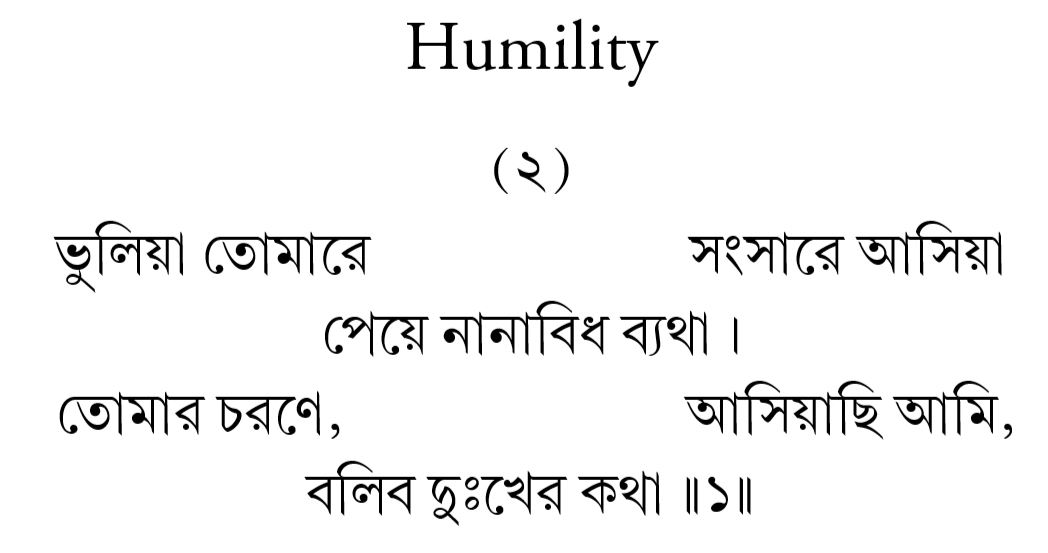Srila Gurudev singing Bhuliya Tomare, December 1989.
Download mp3 audio file
bhuliyā tomāre, saṁsāre āsiyā,
peye nānā-vidha vyathā
tomāra charaṇe, āsiyāchhi āmi,
baliba duḥkhera kathā
bhuliyā–forgetting; tomāre–about You; saṁsāre–in the material world; āsiyā– coming; peye–experiencing; nānā–various; vidha–forms; vyathā–of suffering; tomāra–Your; charaṇe–at the feet; āsiyāchhi–have come; āmi–I; baliba–will say; duḥkhera–of distress; kathā–tale.
[1] Forgetting You and coming to the material world, I have undergone all sorts of suffering. Now I have come before Your feet and will express my tale of distress.
jananī-jaṭhare, chhilāma yakhana,
viṣama bandhana-pāśe
eka-bāra prabhu! dekhā diyā more,
vañchile e dīna dāse
jananī–of my mother; jaṭhare–in the womb; chhilāma–I was; yakhana– when; viṣama–terrible; bandhana–binding; pāśe–with the ropes; eka–one; bāra–time; prabhu!–O Lord!; dekha–sight; diyā–giving; more–to me; vañchile–deprived; e–this; dīna–poor; dāse–to this servant.
[2] While I was bound in the terrible confines of my mother’s womb, You once revealed Yourself to me, O Lord! Yet since then You have deprived this poor servant.
takhana bhāvinu, janama pāiyā,
kariba bhajana tava
janama ha-ila, paḍi’ māyā-jāle,
nā ha-ila jñāna-lava
takhana–then; bhāvinu–I thought; janama–birth; pāiyā–obtaining; kariba–I will do; bhajana–service; tava–Your; janama–birth; ha-ila–happened; paḍi’– falling; māyā (māyāra)–of Māyā; jāle (phā̐de)–into the net (trap); nā–not; ha-ila–became; jñāna (jñānera)–of knowledge; lava (leśa)–a fraction (trace).
[3] At that moment I thought I would engage in Your service after taking birth. Yet when I was born, I fell into māyā’s trap, and not a trace of such consciousness remained.
ādarera chhele, svajanera kole,
hāsiyā kāṭānu kāla
janaka-jananī- snehete bhuliyā,
saṁsāra lāgila bhāla
ādarera–of adoring parents; chhele–a son; svajanera–of relatives; kole–in the lap; hāsiyā–smiling, laughing; kāṭānu–I passed; kāla–time; janaka–of my father; jananī–of my mother; snehete–due to the affection; bhuliyā–forgetting; saṁsāra–family life, the material world; lāgila–felt; bhāla–good.
[4] As a son of adoring parents, I spent my time in their laps, smiling and laughing. Because of my mother and father’s affection, I forgot You and took pleasure in family life (material existence)
krame dina dina, bālaka ha-iyā,
khelinu bālaka saha
āra kichhu-dine, jñāna upajila,
pāṭha paḍi ahar-ahaḥ
krame–gradually; dina–day; dina–day; bālaka–a boy; ha-iyā–becoming; khelinu–I played; bālaka–boys; saha–with; āra–more; kichhu–some; dine– after days; jñāna–faculty of knowledge; upajila (udita ha-ila)–arose; pāṭha– lessons; paḍi–I study; ahar-ahaḥ (dina dina, sarva-kṣaṇa)–day after day (all the time).
[5] Day by day I grew into a young boy and played with other young boys. Later on my intellect developed, and I studied my lessons day in and day out.
vidyāra gaurave, bhrami’ deśe deśe,
dhana upārjana kari’
svajana-pālana, kari eka-mane,
bhulinu tomāre hari!
vidyāra–of learning; gaurave–on the strength; bhrami’–travelling; deśe–in country; deśe–in (another) country; dhana–wealth; upārjana–earning; kari’–doing; svajana–relatives; pālana–maintenance; kari–I do; eka–single; mane–with a mind; bhulinu–I forgot; tomāre–about You; hari!–O Lord!
[6] Then on the strength of my learning, I travelled from place to place, earned money, and maintained my family with undivided attention. I forgot You, O Lord!
vārddhakye ekhana, bhakati-vinoda,
kā̐diyā kātara ati
nā bhajiyā tore, dina vṛthā gela,
ekhana ki ha’be gati?
vārddhakye–in old age; ekhana–now; bhakati-vinoda–Bhakti Vinod; kā̐diyā–crying; kātara–distressed; ati–very; nā–not; bhajiyā–serving; tore–to You; dina–days; vṛthā–vain; gela–passed; ekhana–now; ki–what?; habe–will be; gati–destination.
[7] Now aged, Bhakti Vinod cries in great distress, “Not serving You, I have passed my days in vain. What will be my fate now?”
(prabhu ei bār āmāy dayā kara)
Lord, give Your mercy to me this time.
(patita pāvan gaurahari ei bār āmāy dayā kara)
Saviour of the fallen Gaurahari, give Your mercy to me this time.
(tomāra śrī charaṇe śaraṇ diyā ei bār āmāy dayā kara)
Give me the shelter of Your feet; give me Your mercy this time.
(tomāra śrī charaṇe sevā diyā ei bār āmāy dayā kara)
Give me the service of Your feet; give me Your mercy this time.
(sapārṣada gaurahari ei bār āmāy dayā kara)
Gaurahari with Your associates, give Your mercy to me this time.
(hari he, hari he, hari he!)
Oh Lord!
(nitāi gauraharibol, haribol, haribol, haribol!)
Chant “Nitai Gaurahari”! Chant “Hari”!
The main text of the song here is taken from Sharanagati, by Srila Bhakti Vinod Thakur.

